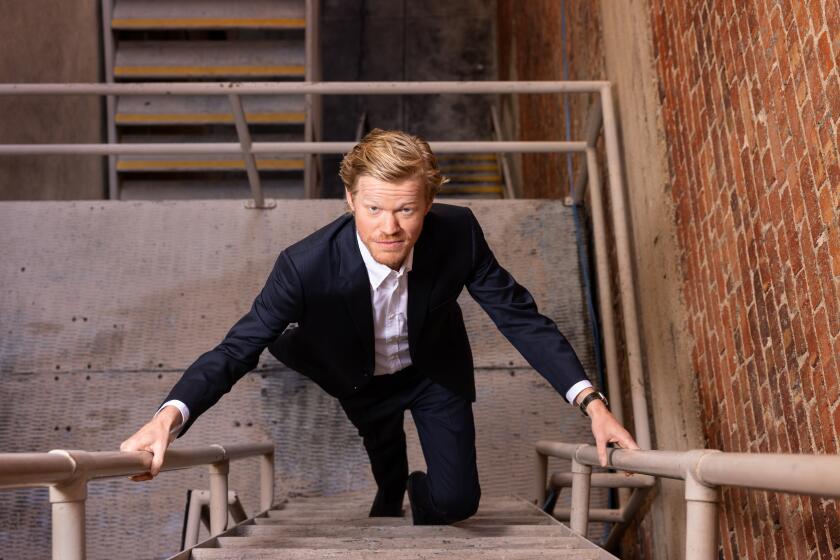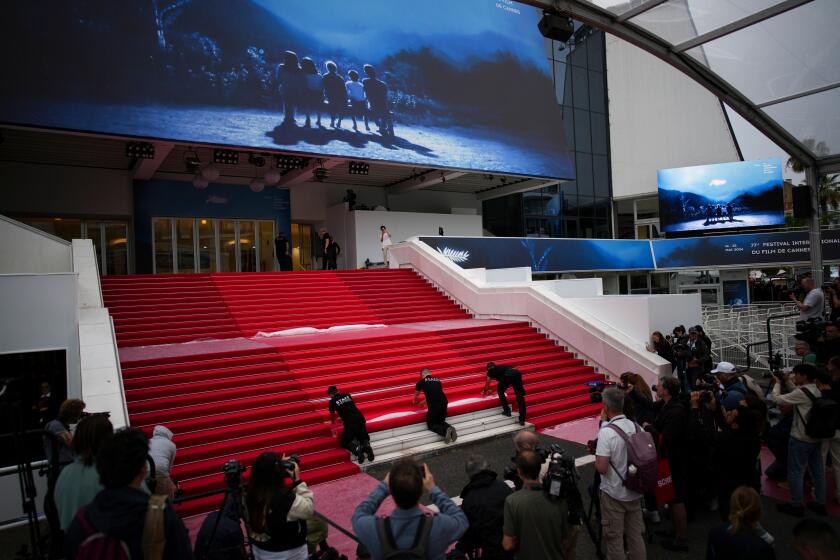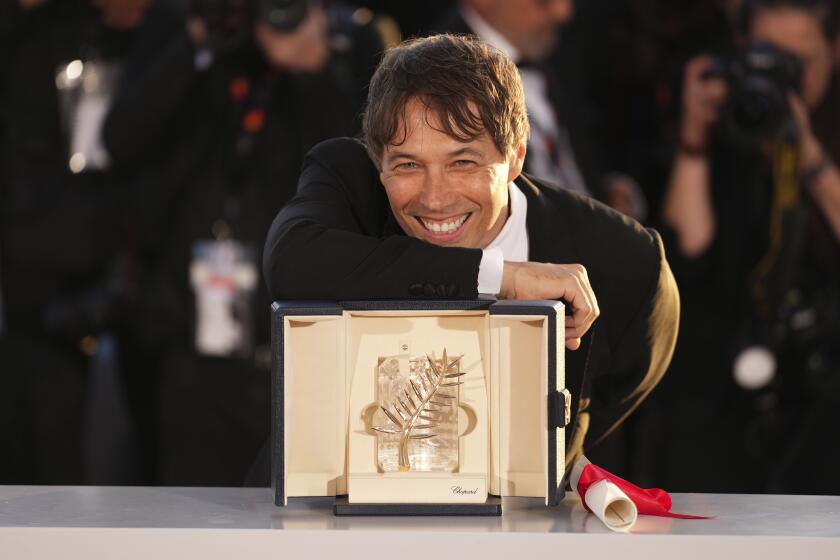A Cannes away from Cannes: fewer movies, but also fewer COVID tests
- Share via
“Daddy, are you watching a movie?”
The question arrives about halfway through Kogonada’s lovely science-fiction drama “After Yang,” a melancholy balm for the moviegoing soul. It’s posed by a young girl (Malea Emma Tjandrawidjaja) to her father (a never-better Colin Farrell), who is indeed watching a movie — actually a bunch of movies, little five-second video clips excavated from the memory bank of a malfunctioning technosapien, or robot. (That’s the Yang of the title, played by Justin H. Min; the rest of the story I’ll leave to your discovery.) It made me smile because it’s a question my 4-year-old daughter often asks me when I’m watching a movie at home, usually with a follow-up: “Are you watching it for work?”
As it happens, I did watch “After Yang” for work. Not at home but at an L.A. press screening scheduled to coincide with the movie’s recent premiere at the Cannes Film Festival, which surged ahead this week after canceling its 2020 edition due to the COVID-19 pandemic. It was a bummer — but a necessary one — to skip this year’s event and miss out on a 10-day glut of new international cinema, plus the chance to see dear friends and colleagues in person, some of them for the first time in two years.
While many of those colleagues chose to sit out this year’s event as well, just as many others opted to take the plunge and embrace an even more chaotic Cannes than usual, braving the masked and unmasked throngs, not to mention the sweltering French Riviera heat. (Postponed until July this year, the festival is usually held in the more temperate climes of May.) I’ve both assuaged and exacerbated my festival FOMO by reading the tweets and trade dispatches out of the festival even more avidly than usual, alternating between nervous chatter about COVID safety protocols and appreciative, even enthusiastic reactions to the movies themselves.
“After Yang,” which is premiering in Un Certain Regard, a program devoted to new and emerging filmmakers, certainly warrants enthusiasm. It’s the second feature-length work from the South Korean-born filmmaker and video essayist Kogonada and an unsurprising confirmation of his talent following his graceful 2017 debut, “Columbus.” Like that movie, though with artificial intelligence standing in for modernist architecture, this wry and wistful futuristic tale has a sharp eye for expressive visual spaces and manages to be both effortlessly cerebral and deeply emotional. It’s based on Alexander Weinstein’s short story “Saying Goodbye to Yang”; the tweaked title couldn’t help but remind me of Hirokazu Kore-eda’s “After Life” (1999), another achingly delicate movie about grief, loss and memory.
Leos Carax’s sixth feature, a musical made in collaboration with Sparks’ Ron and Russell Mael, also stars Marion Cotillard and opens the 2021 Cannes Film Festival.
“After Yang,” which is being distributed by A24, is one of a handful of Cannes entries that, by the kindness of publicists and distributors, I was able to see here in L.A. before and during the festival. Even if I’d smuggled in a flask of rosé and a hunk of cheese, it wouldn’t have been quite the same experience as seeing a movie in the best and biggest theaters at Cannes’ Palais des Festivals, where a film can receive anything from a rapturous five-minute standing ovation from the black-tie crowd to a storm of derisive boos from the press. One of the most obvious differences is that when you watch a movie by yourself, you often feel even freer to receive the movie at its own pace and volume — an approach that can work well for a film like “After Yang,” whose hushed, unhurried passages have the effect of gently recalibrating your rhythms.
An audience of one can also work for a leaner, pacier story like “Lingui,” even if this latest drama from the Chadian director and Cannes veteran Mahamat-Saleh Haroun (“A Screaming Man”) also features moments that call for righteous applause. Playing in competition for the Palme d’Or, the festival’s top prize, the movie unfolds on the dusty outskirts of Chad’s capital, N’Djamena, where a woman (Achouackh Abakar Souleymane) is driven to initially desperate, increasingly defiant action when she learns that her 15-year-old daughter (Rihane Khalil Alio) is pregnant. A blistering attack on patriarchy and a warm reaffirmation of “the sacred bonds” (the meaning of the film’s title) among women, it’s a bracing work that passes quickly in 87 minutes. But the world it shows us, etched in fully felt performances and beautifully hued compositions, feels vividly, sometimes overwhelmingly present.
“Lingui” felt especially taut compared with some of the baggy, 140-minute-plus running times that have swollen the Cannes official selection. I’m speaking mainly about the festival’s divisive opening-night film, Leos Carax’s beguilingly deranged musical “Annette,” which stars Marion Cotillard and a mesmerizing Adam Driver and features songs by the art-pop duo Sparks. Just as long if more stylistically straightforward is “Stillwater,” Tom McCarthy’s involving drama starring Matt Damon as an Oklahoma oil worker trying to free his daughter, who’s serving time for murder in a French prison. Like much of what gets unveiled in Cannes, both these hot-ticket selections had their admirers and detractors. Both also proved emblematic of the cultural cross-pollination that a major international festival such as Cannes likes to embrace.
“Stillwater,” named after a city in Oklahoma, takes place almost entirely in the French port city of Marseille. “Annette,” though set in Los Angeles and full of local landmarks (Disney Hall! The Orpheum! Naan Hut!), was shot mostly in Belgium and Germany and carries the inimitable sensibility of one of France’s most daring auteurs. Still to come next week in the Cannes competition, along possibly similar lines: Wes Anderson’s “The French Dispatch,” which is set in and around a Kansas newspaper’s French foreign bureau, and which features French actors such as Léa Seydoux and Mathieu Amalric, and French-sounding actors including Timothée Chalamet, alongside such seasoned members of the Anderson repertory as Tilda Swinton, Bill Murray and Owen Wilson.
The abundance of French and French-adjacent product is never a surprise in a festival that exists, among other reasons, to promote the French film industry and a proud vision of French cultural tradition to the world. It also invariably features a number of French filmmakers working in different cultures and languages. This year, that group includes not only Carax but also Eva Husson, previously in competition with her 2018 war film, “Girls of the Sun,” who returned to the festival with the English-language period drama “Mothering Sunday.”
Unveiled in a new out-of-competition section called Cannes Premiere, this absorbing if inelegantly fractured adaptation of Graham Swift’s novel centers on Odessa Young (“Shirley”) and Josh O’Connor (“The Crown”) in nicely played, uninhibitedly fleshy turns as an early 20th century English housemaid and the wealthy scion she’s having an affair with. A forthcoming Sony Pictures Classics release, “Mothering Sunday” suggests a stray tendril of “Downton Abbey” expanded to feature length, splintered into three time frames and then funneled, with much loud banging of typewriter keys, into the origin story of a great literary mind. It never quite comes together — the decades-spanning connective tissue somehow feels both overstated and thin — but Husson’s skill with actors, among them Colin Firth, Olivia Colman, Sope Dìrísù and the great Glenda Jackson, yields undeniable dividends.
As it happens, the best Cannes 2021 movie I’ve seen so far is also the story of an English artist coming into her own: a young London film student named Julia (the superb Honor Swinton Byrne), struggling to reconcile life and art after a devastating personal loss. If the particulars sound familiar, that’s because “The Souvenir Part II” is a sequel — a masterful, perhaps even superior sequel — to Joanna Hogg’s 2019 standout, “The Souvenir.” Together, the two form an exquisite, semiautobiographical two-parter that tells a story we rarely see, at least not with this level of intelligence, detail and feeling: It’s a great filmmaker’s youthful self-portrait, affectionate and critical by turns, and a welcome reminder that at their purest, affection and criticism spring from the same generous impulse.
A forthcoming A24 release that premiered in Directors’ Fortnight, a program that runs parallel to the Cannes official selection, “The Souvenir Part II” is somehow both sadder and funnier than its predecessor, shorter (I wish it were longer) but even more cumulatively heartrending. As ever, Hogg is working so close to the bone here, so immersed in the minutiae of her ’80s education and yet so attentive to how she situates the viewer in that world, that even throwaway moments seem to achieve disproportionate impact: There’s a moment that transpires between Julia and her mother (again played by Tilda Swinton, the lead actress’ real-life mom) that is so hushed, yet so acutely devastating, that it made me gasp aloud in my nearly empty theater.
More than with any of my Cannes-away-from-Cannes screenings, I left “The Souvenir Part II” unusually perplexed at not having anyone to talk about it with, only to be seized by a familiar, reassuring impulse, the one that takes over on those occasions when a critic becomes an evangelist. I’ve seen an amazing movie. And I hope that someday very soon, you’ll get to see it too.
More to Read
Only good movies
Get the Indie Focus newsletter, Mark Olsen's weekly guide to the world of cinema.
You may occasionally receive promotional content from the Los Angeles Times.











